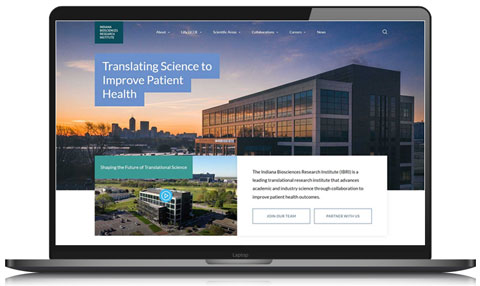One of the IBRI’s objectives is to enable the development of innovative solutions to improve patient health. While we do this through discovery, collaboration and research in our labs, we also fulfill this objective in the community through service, support and teamwork.
Startups drive innovative biotechnology
Helix BioStructures, LLC, is a life-science contract research organization that provides early drug discovery services to biotech and pharmaceutical companies. Founded in 2018, Helix’s core service centers on determining the structure of proteins aiding their clients in developing novel therapeutic molecules. Sophisticated imaging techniques are employed utilizing X-rays (X-ray crystallography) or electrons (Cryo-EM) to determine the structure of these target proteins. Most recently, Helix has been developing internal software to increase efficiency and improve turnaround times. Once this software is further refined it will be made commercially available to assist other early-stage drug companies by reducing the time it takes to bring new drugs to market. In 2020, Helix was excited to occupy the new labs within the IBRI that offers the infrastructure, instrumentation and space the company needed to expand. “The IBRI has been integral to helping us nurture what we’ve built,” said Helix CEO and co-founder Josh Carter. “Its facilities have allowed us to provide excellent services to our clients and opened the way for a number of new mutually beneficial collaborations.”
Imagine being able to transform energy-storing white fat into energy-burning brown fat. This is what Adipo Therapeutics is developing – a first-in-class technology platform that could soon treat type 2 diabetes and other obesity-related diseases. The nanoparticles Adipo Therapeutics is developing would be injected directly into subcutaneous fat to induce a transformation that could raise energy expenditure, improve insulin sensitivity and reduce total body weight. Adipo Therapeutics CEO Karen Wurster noted, “Only about half the population being treated for type 2 diabetes are reaching their goals. This work has the potential to lead to a safe, effective way of controlling body weight and glucose through a completely new approach.” Founded in 2016, Adipo Therapeutics moved to the IBRI’s new building in 2020 because the facility offered the company access to the lab space, equipment and collaborators (both inside and outside of the IBRI) it needed to grow.
New website refreshes brand, highlights strategy

The new IBRI website that launched in March 2022 features an interactive graphic that takes visitors through our updated strategy. It also highlights our scientific resources, current research and community work. New additions to the website include detailed information about our conference center, a spotlight on our soon-to-be chemistry lab and what life is like at the IBRI.
Open house celebrates collaboration
In August 2021, we celebrated our first year in our new building with a public open house. Since much of that first year was spent only occasionally coming into the office, it was a thrill to show off our space to our collaborators and partners, many of whom were seeing it for the first time. Our assistant investigators used the opportunity to draw attention to their current research, a few of our vendors raised awareness of their work with us and the delicious food of 16 Tech brought everyone together.
Templin Lab prepares next generation STEM leader
Andrew Templin, PhD, leads the Indiana Clinical and Translational Sciences Institute’s Indianapolis Project STEM for the IBRI. During eight weeks last summer, Templin and his team had the opportunity to work with Jayden Pierce, now a senior at Riverside High School. Following the summer program, the IBRI and Templin Lab had the opportunity to welcome her back for a yearlong internship. Pierce has quickly picked up polymerase chain reaction (PCR) for genotyping and completed in silico analyses of genetic mutations found in the mouse models studied by the Templin Lab. Pierce said she has enjoyed her time in the lab, “I learned how to read research papers, the value of teamwork in the lab and how to observe and use a lab notebook so I can accurately re-create an experiment.” Templin acknowledged that this has been an opportunity for him to get back to the basics in science. “The techniques we have taught her are basic, but she hasn’t had the opportunity to do them before,” said Templin. “The science behind what she’s learning is fascinating, and you can see that as you watch her take it all in. Mentoring experiences like these are good reminders of the passion science can generate in people.